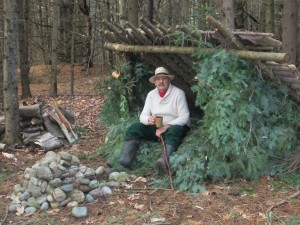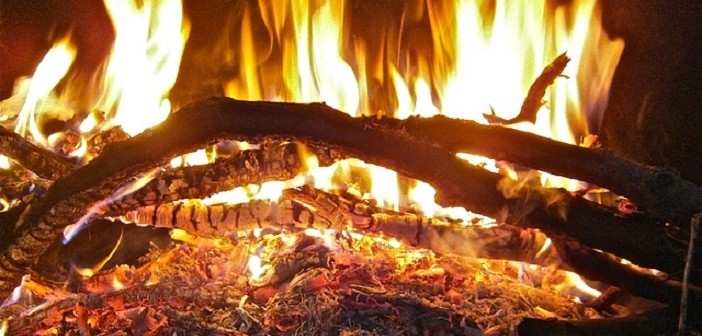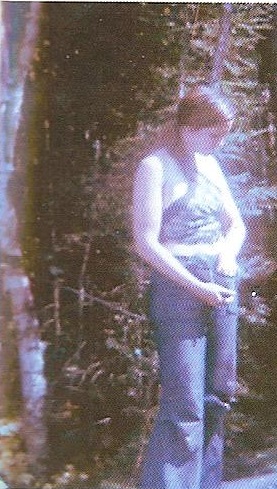DE BIG-SHOT TRAIN: A Northern Love Affair with Algoma Central Country
A Rough and Ribald Story of a Lifetime in the Bush
~ by Robert Cuerrier
Chapter 6 Outdoor Living
City Shoes
I married a southern Ontario gal in the late sixties and brought her north. Our life experiences had been polar opposites. I was a tragically hick northern kid more suited to a plaid jacket and a packsack than a suit and briefcase. She had never met a blackfly.
I figured to acclimatize her with a trip up the line to camp, canoe, fish and relax. Nothing too hard bold to start with I was thinkin’ –a soft wilderness adventure. Things began to unravel as soon as we detrained at Spruce Lake and she noted that there wasn’t much there beyond the flagstop. Things got worse, and she’s had me looking at sensitivity issues ever since.
We hiked three miles on an old tote road into Wart Lake, me with a big old clunker canoe on my back that weighed as much as I did and Susie with a packsack that would have challenged a voyageur. Of course I’d assured her that there was nothing in the bush that would hurt her and animal sightings were something you had to work for.
And then there are unfortunate anomalies. After paddling for a while we were going to beach the canoe when we saw a black bear, and a big one, standing on its hind legs just like in the movies and only a few feet away –but much closer to Susie who was seated in the front of the canoe. I took a deep breath and back paddled away, shrugged when she mentioned it. At the next prospective campsite we got out of the canoe, and she stepped on the biggest snake I’d ever seen, so we moved on and camped on an island where she developed the pagan hatred for mosquitoes and blackflies that she carries with her to this day. Things were not going well.
We went stream fishing the next day and that was pleasant enough ’til I noticed she was releasing the best pan sized trout that would have been our supper because she thought they were too small. I can’t catch fish and began to worry that she might not have the galvanized stomach needed to handle the salt pork dinner we were headed towards. I started working the stream harder and while wading through a current lost one of the town shoes I was wearing; at the time we were struggling and I had no other footwear. In hot pursuit I chased it down the stream and caught up with it in a deep pool and tried to grab it with a stick, but it sunk. Too deep to dive I just said, “hell”, committed the other one to the waters, and went barefoot and blistered ‘til the end. Susie learned the bucheron’s verbal dismissal of hard times: “That’s the bush!”
Campfires
If you’re living outside you spend evenings staring into your campfire. I think this is innate in man; it’s only been the last few generations that man hasn’t had visible fire for warmth and cooking. Looking into the flames seems to be a complete and natural contemplative relaxation. You soon find yourself drifting as you learn the secret of the trance.
I believe that today folks still have that need and unwittingly try to satisfy it by watching TV. Now television is surely mindless, but it is intrusive and lacks the same meditative qualities of the fire.
Indians have always believed that campfire is the mirror though which we see ourselves, a revelation of our thoughts and deeds, a conscience. If you see yourself through some improbable angles you’re supposed to keep staring until you see ways to smooth out your image. When you’re in the bush watching the fire deep in the night you watch the stars and the horizon too. I love the dark profiles on the whiskered hilltops of huge Spruces or White Pines that tower over all others. I have friend who calls them ‘sentinel trees’, on guard for life’s natural order.
Some fires are considered sacred. We use a cedar and birch bark smudge to purify ourselves on entry to the bush. Tobacco is laid on the flames as an offering to the land for shelter, fuel, fish, game, and vegetation you will use.
The same kind of fire is lit for the spirits of friends who have just crossed over. You ring the fire with stones; they will represent the souls of the departed. Lay down birch bark and cedar kindling for strong flame and a fast fire. Spark it up and say your good-byes. Sprinkle on tobacco to honor their spirits. Let it burn hard and die out, and it becomes a metaphor for life. And for yourself remember this Métis adage: “Yesterday is wood, tomorrow ashes. Only today does the fire burn brightly.”
Naturally when you’re living in the bush the cookfire is central to warmth and hot food and drink. Often the work is relentless and sometimes cruel, the grub monotonous. Back when we built log cabins, we used to sleep out and in hard weather until we had a roof. We rarely got to town. We sorely missed women. But I’m drifting here. The point is we woke up sore and tired and sometimes sullen. My partner and I made a pact that we wouldn’t speak until the coffee was made.
We made a fast fire out of the driest tinder. It flashed! Although it was grounds boiled in a billycan, we called it ‘instant coffee’ because we could get it going faster than you could on an electric stove.
There are social conventions around the cookfire just as there are when having dinner at home or dining out. Never add wood to or stir another man’s fire. You don’t know where he’s going with it, where on it he’s planned high, medium and low, simmer or warm up. You’ll be seen as a true wonderment if you mess with it. The rule of thumb here is that you must have camped with a man seven years before fooling with his fire.
Never walk between someone and the fire; go behind a person it you must move. Try to keep to your seat as you would elsewhere. It makes a bucheron anxious to witness undue scurrying around the campfire.
Perhaps the most important etiquette is respect for another man’s mug. Never, never use or touch on in camp or on the trail. You see, they never get washed and are as personal an item as a toothbrush. Your fingers on someone’s cup would constitute the greatest breach of manners. Everyone’s mug should be different or distinguished by some sort of flagging. Often in the camps of close friends you will be given a mug that you can hang somewhere and know it will go untouched between visits.
And to really enjoy campfire dinners you’ve got to preheat your cup and dinner plate by setting them by the campfire before filling them; otherwise, the cold will suck the life out of your grub before you eat it.
Tea And Coffee
Not too far back tea was the campfire drink of preference north of 60 and is largely still to this day among far northerners and especially among the Indians. This is because of the fur trade routes of long ago when goods and tea came in from England through Montreal and through Hudson’s Bay. Coffee was considered a brew for lesser climes and for Americans. Regardless of preference you always seem to drink too much of one or the other when you take the time to make it. So just before bed it is custom to brew up Labrador Tea, a plant found in marshes, as a soothing tisane to relax you before sleep.
*****
 Robert Currier, or as many know him- Farmer Bob, has lived on the land traditionally most of his life. He has built wilderness log cabins, logged, guided and prospected. He was the first recipient of the CBC/Big Brothers “Northern Moose Award” for best personifying the spirit of Northern Ontario.
Robert Currier, or as many know him- Farmer Bob, has lived on the land traditionally most of his life. He has built wilderness log cabins, logged, guided and prospected. He was the first recipient of the CBC/Big Brothers “Northern Moose Award” for best personifying the spirit of Northern Ontario.
Farmer Bob lives on his Mockingbird Hill Homestead Farm in beautiful Hiawatha Highlands, which backs onto Odena, Mile 9 on the Algoma Central Line. The farm is a singular burst of colour and beauty and one of Sault Ste. Marie’s premier attractions. It is open to the public year round.
Mockingbird Hill is a horse drawn replica of a Métis homestead in the thirties and forties. In summer the farm features wagon rides, market gardening, a petting barn, a corn maze, and a spectacular wild flower walk.
In winter Mockingbird Hill offers horse drawn sleigh rides and cutter rides on trails that are breathtakingly beautiful by day and romantically lantern-lit by night.
De Big-Shot Train by Robert Currier can be purchased at the Art Gallery of Algoma.
1.705.253.4712



